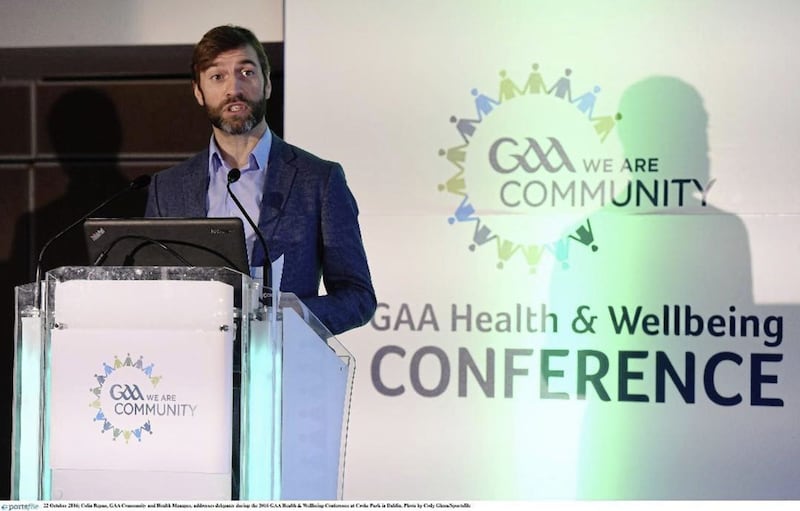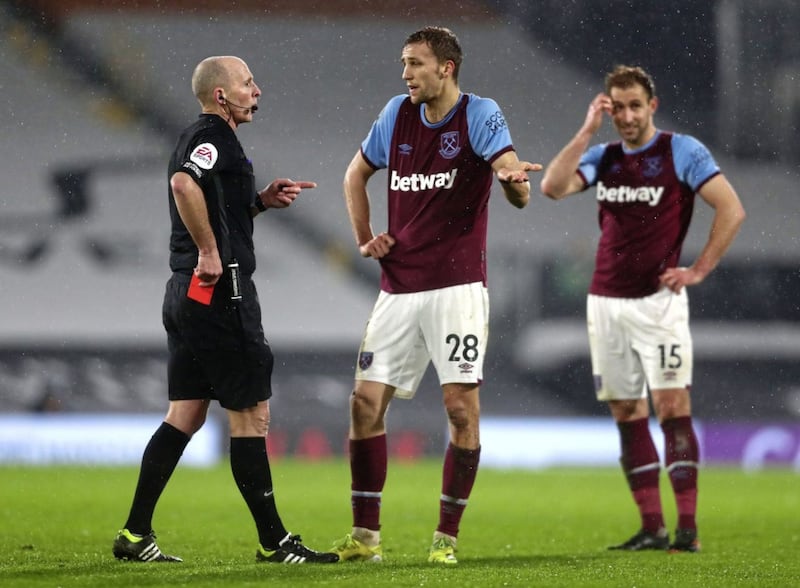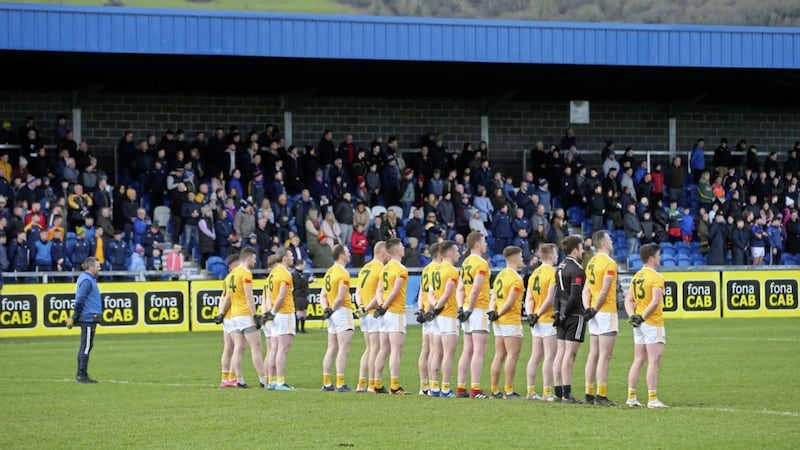IF you stumbled upon the end of a rainbow and there sat a pot of gold with your name on it, would you stop to question where the money had come from, or would you take it and ask later?
Sport and money will always have a relationship in which the lines are blurred. In the last few weeks alone, we’ve seen Cork GAA mired in an argument over whether it should be aligning with Sports Direct, whose reputational damages seem so relatively insignificant when you get into the debate over Daniel Kinahan’s involvement in boxing.
Different sports take a different view but no others have taken the admirable hard line that the GAA has with gambling.
A few pound on a weekend accumulator to keep the games interesting may seem harmless, and for the majority it is, but the growing issues of problem gambling in Irish society and the lack of regulation around the industry have slowly turned the spotlight’s wattage up.
In 2018, the GAA’s Annual Congress overwhelming backed a motion that banned any form of sponsorship by a gambling company. 93 per cent of delegates voted in favour of the ban.
As only a very small handful of existing sponsorship deals were in place, the chains were relatively easily broken.
“The ban was about protecting our members and the integrity of our games,” says Colin Regan, the GAA’s Community & Health Manager.
“You hear the associations between boxing and organised crime, or the negative influence gambling can have in terms of syndicates or external agents trying to influence the outcomes.
“We found so few GAA units had any relationship with a gambling entity that now was the time to strike before the horse had bolted.”
At the time, the hooks were still finding their way through the skin of society, and there were very few established links within the GAA.
Derry had a brief spell with Ladbrokes on their jersey, while Armagh had a relationship with BoyleSports, who paid the €5,000 fine handed down to Armagh after their 2014 pre-match row with Cavan.
In club terms, Crossmaglen’s relationship with local firm Bar One Racing was the most high-profile of its kind.
That was one that did leave Oisin McConville with a moral dilemma. His book, The Gambler, lifted the lid on his own problems during his playing days.
It hadn't long been been published when Crossmaglen signed the new sponsorship deal.
With a straight choice between wearing it and quitting football, he had to swallow it to continue pulling on the black and amber.
Regan replaced Brendan Murphy in 2011. The latter had been seconded from the HSE at the time as the GAA went deep on examining its links with alcohol in the midst of another national discussion.
Ireland was among the highest consumers of alcohol in the OECD. The GAA developed an alcohol and substance abuse programme and ultimately moved away from top-end sponsorship deals in 2014, having had Guinness as one of its most recognisable brand partners in the years before that.
Rugby swiftly moved in. Nobody has driven the slogan of Rugby Country harder than Guinness in recent years, a far cry from when it was synonymous with hurling.
The company now sponsors the Six Nations, its logo front and centre in the empty stadiums of the past few weekends.
Regan recalls the days of stopping in the local pub after underage matches for crisps and minerals “when there might have been a couple of scoops taken by the adults”.
There were also the tobacco days, on which British sport in particular was so hooked through the likes of Benson & Hedges, Silk Cut and Embassy.
They were once so intertwined with the games themselves that competitions seemed bare when their names were banned from attachment in the late 1990s.
Government legislation was slow to happen in both cases, but it eventually did.
“I hope we’ll be looking back from a legislative perspective on something similar to the change in tobacco advertising in sport, where we look back now and think ‘how could we allow that association to be so dominant and prevalent at the time?’. You hope we’ve evolved as a society,” says Regan.
“I’m not saying we can’t go out and bet. If that’s your buzz, go and do it, but sport in itself is adequate enough without there being the need for a financial association to the outcome.
“It’s not even to the outcome any more – it’s down the minute detail of what can happen in a game. It’s out of control now, what they’re trying to align between a betting opportunity and sport. That’s betting for betting’s sake.”
The way in which the online gambling market has exploded even since then has created financial powerhouses in the industry.
Their keenness to be associated with, and help fund, top-level sport appears less out of the goodness of their hearts and more for visibility purposes.
€14m per day is pumped into the industry by Irish punters. Ireland ranks third highest in losses per capita of any country in the world.
In 2018, the GAA’s ban on sponsorship was a case of not missing what they never had.
Gambling companies have rarely had any direct relationship with the GAA, but they have a hold on many young people dotted through changing rooms across the land.
Not that it’s being given any consideration but even the idea of ever buckling under the need for income and reversing the ban on sponsorship is a complete non-runner for Regan.
“I don’t think it would get any support within the association,” he says.

“It’s time for the government to properly tax the enormous amounts of money that the gambling industry is making off the back of Gaelic Games and direct it back into addiction services.
“In the space of gambling, services are basically null and void on this island bar private. Funding should be ring-fenced for health-enhancing programmes and initiatives directed through the sporting network.
“That’s not the GAA benefitting singularly, I think there’s an opportunity for pan-sporting initiatives to tackles issues associated, perhaps particularly focusing on men’s health issues around suicide rates.
“A united voice from GAA, rugby, soccer, athletics, hockey can reach an audience that public health messaging just can’t,” says the former Leitrim player.
______________________
PERHAPS the scariest statistic of all is that the UK’s gambling commission’s 2018 audit suggested that 55,000 children – yes, children – were “problem gamblers”. More children place a weekly bet in the UK than take drugs or alcohol.
Ireland does not have a gambling commission. It is an industry that is so poorly regulated in this country, yet successive governments have dragged their heels.
A Gambling Control Bill has been rattling around the Dáil for eight years while Irish law still permits betting on credit cards – basically, people gambling with money they don’t have.
The laws are based on acts drawn up in 1931 and 1956, a time long before the internet.
The College of Psychiatrists of Ireland called in December for an “urgent ban” on gambling advertising in sports, saying that Covid-19 was feeding what was already “a hidden epidemic” and “a public health crisis”.
There is no vaccine.
The reliability of data on the subject is questionable. Some studies suggest there are 30,000 problem gamblers in the Republic yet others say 40,000 in the north, which would be out of sync with their populations.
Governments tend not to want to clamp down on big business and, with an estimated annual value of €8billion, gambling is among the biggest.
Flutter Entertainment, which has a market-dominant share in the UK and Ireland as the new umbrella for Paddy Power, Betfair and Sky Bet, made revenues of £1.33bn in one quarter of 2020 alone.
In the three months up to September 30 last year, online revenue grew by a third on the previous quarter as sport returned, while the Irish market grew by 26 per cent and the UK’s 32 per cent.
Big bookmakers have money lying around that many of them have decided to push back into sport.
In the toughest of financial times for sport as a whole, the gambling industry has done a lot of the Premier League’s propping up.
Eight top-flight teams bear the names of gambling companies on their shirts. Last season, it was ten. In all, that contributed £69m to those clubs in the 2019/20 season alone.
The broadcasters, who have been able to show every single game live during the Covid pandemic, make a fortune off the advertising.

For instance, when sport was paused during the pandemic last year, Sky’s advertising revenue dropped by 43 per cent. Among the reasons they cited were tighter laws restricting gambling ads in the UK.
Yet despite that, the first two games after the Premier League returned featured no fewer than 24 separate gambling commercials, 14 of which were shown before the 9pm watershed.
All forms of mainstream media are heavily laden with gambling advertisements. There are also the indirect ads, such as match previews carrying the odds.
Whether accepting advertising money from bookies strips away the media’s credibility is a valid question.
“I understand the financial requirements of the media industry, the challenges around print media particularly are enormous, but the GAA can be held to an incredibly high standard. Rightly so, because we challenge ourselves to meet those standards,” says Colin Regan.
“It’s really important that the media, as an industry on the whole, does take a look at its position within society as regards this.”
It is an area into which the GPA have delved.
Off the back of the jointly-commissioned ESRI report in 2018 and the sponsorship ban, the players’ body put forward a motion to last year’s Annual Congress that proposed implementing a ban on broadcasters showing gambling ads during GAA broadcasts.
______________________
GPA Member Support Lines
ROI 1800 989 285 or Text GPA to 50808
NI0800 044 5059 or Text GPA to 85258
______________________
That was always going to be significantly trickier to get done. It was passed along to Central Council for discussion but given that the GAA would be attempting to dictate to broadcasters what advertising they can accept, it is a long-shot that ultimately goes back to the issue of legislation.
But they are determined to keep the issue front and centre.
“That’s something we still will be advocating strongly, in terms of banning advertising during the broadcast of live games,” says the GPA’s Player Welfare Manager, Jennifer Rogers.
“It will be prioritised as soon as Covid-19 settles down again. We’re using every opportunity we can to impact change, but our predominant concern is looking after players and making sure the supports are there for them when they need them.”
Because when it comes back to seeing the human cost, she is on the frontline.
______________________
OISIN McConville was the first high-profile GAA player to speak out about a gambling addiction through his book, The Gambler, published in 2007.
Now a trained counsellor, McConville speaks regularly on the topic, along with the likes of Offaly forward Niall McNamee.
During the first lockdown they both headed a GAA webinar along with former Galway hurler and psychotherapist Justin Campbell.
“Oisin and Niall were saying they still receive calls from GAA people who are in distress around their problem gambling, or are beginning to suspect they might be problem gamblers,” says Regan.
Just a few months ago, current Armagh forward Stefan Campbell opened up about his own issues in an interview with McConville.
He joined the likes of Galway hurler Davy Glennon, whose stark recollection of losing €12,000 the week before the Leinster final in 2015 left his mind in ruins.
His game lasted just 24 minutes. Glennon hit rock bottom the following week and contemplated suicide before he sought help from his parents.
The GPA's counselling services were praised in his interviews once he had spoken publically after getting his life back on track.
When McConville spoke out, Ireland’s mental health conversation was only beginning. And while advancements have been made, there’s still a sense of stigma attached to it all.
The GPA does not provide specific recent figures in terms of the issues faced by those that contact their counselling services in a bid to protect their confidentiality.
The last two sets of figures available did indicate the transition.
In 2014, 38 players had come forward with issues around depression. 19 had presented with gambling problems.
The following year, gambling issues had overtaken anything else. 29 players, almost 25 per cent of the overall number of cases that year, related to betting.
Figures beyond 2015 are no longer publically available, primarily because the GPA resolved to strengthen the confidentiality of its services, but problem gambling is “among the top-presenting issues each year”, says Jennifer Rogers, a Westmeath footballer herself.
“What we know from players and about young males in general, that they’re reluctant to seek support because of the stigma that’s there. We do have the numbers ourselves, we don’t share them because of the confidential nature,” she adds.
Paltry services and the cost of private rehabilitation on top of any gambling debts can weigh very heavily. One in five problem gamblers will attempt suicide.
Past international studies have shown that elite athletes are at particular risk of gambling problems, although the amateur element of playing GAA does create a deficit of information.
NUI Maynooth were due last year to start a national prevalence survey on gambling, but Covid stopped the idea in its tracks.
Just as there is little in the way of regulation, there are also few numbers swirling around.
“In the absence of very accurate data, advertising spend by gambling companies is a good indicator of how the industry is doing. I think that speaks for itself at the moment,” says Regan.
One valuable piece of data was in the GAA/GPA commissioned ESRI report that revealed 80 per cent of inter-county players felt they had team-mates who were betting on a “daily or weekly basis”.
A 2012 GPA survey had the figure who believed there was a gambling culture within their own squad at 7 per cent, which goes to show the increase in prevalence.
“It’s important to say that problem gambling is a wider societal issue and the GAA and GPA is a just a microcosm,” said Rogers.
The players’ body have twice taken PaddyPower to task. They made their displeasure known when the bookmaker used player names and images for a list of 100 most attractive male players, as chosen by American females, in 2015.
The GPA then had a complaint upheld by the Advertising Standards Authority for Ireland [ASAI] on behalf of Dublin and Mayo players around the use of image rights around the 2018 final.
They’re minor victories in a war that isn’t the GAA’s or the GPA’s to fight, but that they’re doing their level best in.
Turning away the potential sponsorship money leaves a financial injury for the GAA but in taking the high ground and not driving gambling down throats, there is a little salvation for the soul.
But significant growths in online gambling suggest the problem is only growing irrespective.
It is up to governments both sides of the border to put the brakes on.






